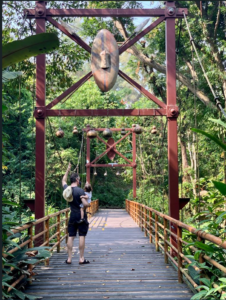 Dear Integral Meditators,
Dear Integral Meditators,
This weeks article explores trust as an object of mindfulness. Trust is a wonderful quality to experience in your life, facilitating both enjoyment and effectiveness. What if you were to begin integrating it consciously today? What differences might you start to notice?”
Wishing all of you all the very best for the upcoming lunar new year of the Tiger. Its a nice point in the year to take a pause and meditate. I’ll be facilitating a session entitled Lunar New Year Meditation 2022: Developing your inner power in the year of the Tiger on Tues & Weds Feb 1st & 2nd. All welcome!
In the spirit of trusting,
Toby
Four levels of mindful trust
There are essentially four levels of trust and trusting that I want to focus on and highlight:
- Trusting yourself
- Trusting others
- Trusting in something bigger than yourself
- Trusting your path
To trust yourself is to trust your capability for thought action to be consistent with your intentions; to trust yourself to say what you do, and do what you say you will do.
To trust others is to notice and appreciate people around you who are trustworthy, who are consistent in their stated intentions relative to what they do. It means to make conscious choices about who you invest your trust in and who you do not. Its not a matter of who you want to be trustworthy, its more a matter of who you notice and observe to be trustworthy.
To trust something higher and bigger than yourself is to allow you and your life to be held by a benevolent larger force, in whatever way you conceive it. It could be thru a conventional lens of God/Goddess/Buddha Nature, or something more along the lines of a Universal intelligence or the Tao, any frame-work that works for you.
To trust your path is to trust the unfolding process of your life to lead you to things that are worthwhile and of value. The path itself is the thing to be trusted, even if it seems to be a winding one sometimes.
Meditating on the four levels
To meditate on these four levels, either in sequence or individually is to dwell and relax into the state of trust around each of them:
- What it feels like when you experience yourself as reliable and trustworthy
- When you sense you can really trust another, appreciating them and allowing yourself to enjoy the feeling of trust between you
- To familiarise yourself with the state of being held by a higher or deeper force
- To notice and flow with your path, trusting its process and wisdom
With all of these we hold them mindfully to become familiar enough to use them in daily life and to hold them under pressure, even when we are stressed or triggered.
Strengthening trust in your daily life
If you start to work mindfully with trust, its important that your daily actions align with it, for example:
- If you say your going to do something and then don’t, its not going to increase your self-trust! You have to be consistent with yourself
- You need to keep discerning who to invest your trust in and who not to, and appreciating/enjoying those who are trustworthy, reciprocating their trust
- When you are going through a challenge, notice the instinct to feel alone and without help sometimes. Practice trying to open to a higher or deeper force instead of closing off, practice trusting your path and relaxing into it rather than panicking the moment something unpredictable happens.
Trust is a wonderful quality to experience in your life, facilitating both enjoyment and effectiveness. What if you were to begin integrating it consciously today? What differences might you start to notice?
Related articles: Representing your values – Mindful self-trust
Trusting Yourself (Your first Guardian Angel)
Article & content © Toby Ouvry 2022, you are welcome to use or share this article, but please cite Toby as the source and include reference to his website www.tobyouvry.com
 Tues & Weds Feb 1st & 2nd – Lunar New Year Meditation 2022: Developing your inner power in the year of the Tiger
Tues & Weds Feb 1st & 2nd – Lunar New Year Meditation 2022: Developing your inner power in the year of the Tiger
About the class: This is a meditation to welcome in the lunar new year energies, and attune to the astrological animal of the year, the Water Tiger! In particular, we will be mindfully aligning with and developing our inner and outer power as well as other primal characteristics of the Tiger.
Toby will be leading the meditation as a simple and profound way, with plenty of room for our own personal contemplation, inner healing and positivity building! Full details here
Are you looking a coach who can help you to:
- Meet the challenges, stress and changes that you face in a more effective and mindful way
- Become happier within yourself, in your relationships and at work
- Be actively accountable for finding a sense of balance/well-being in your life and fulfilling your personal potential?
- Guide you to find and operate from a deeper sense of meaning, motivation and connectivity in your life?
All upcoming classes and workshops at IMA:
Ongoing – Weekly Tuesday, Wednesday Online class schedule
Ongoing on Wednesday’s, 7.30-8.30pm – Wednesday Meditation for stress transformation and positive energy with Toby (Bukit Timah)
Ongoing on Tuesday evenings, 7.30-8.30pm – Tuesday Meditation for stress transformation and positive energy with Toby (East Coast)
Ongoing January-March – Zen: The ordinary path to enlightenment – Meditating with the Ten Ox Herding pictures
Tues & Weds Feb 1st & 2nd – Lunar New Year Meditation 2022: Developing your inner power in the year of the Tiger
Saturday Feb 26th, 9.30-11.30am – Monthly Qi Gong & Taoist Breathwork Clinic & Mini-retreat
Integral Meditation Asia
Online Courses * 1:1 Coaching * Books * Live Workshops * Corporate Mindfulness Training *Life-Coaching * Meditation Technology

 Dear Integral Meditators,
Dear Integral Meditators,

